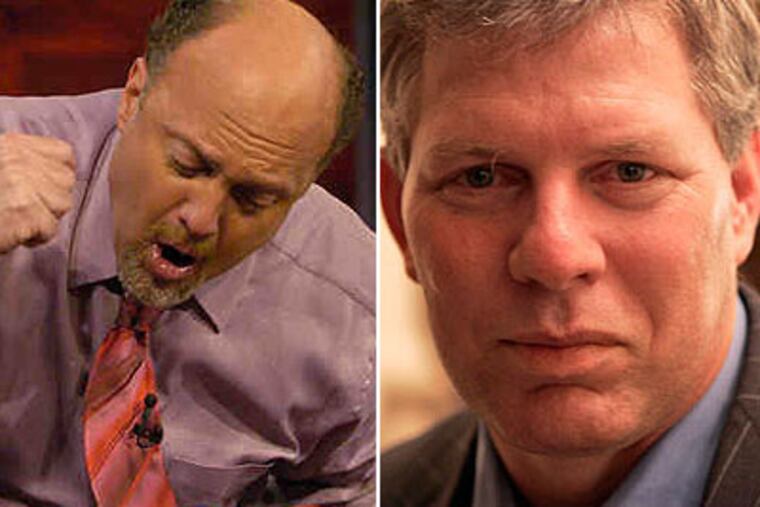Nailed: Dykstra took $ to hype stocks, book says
An explosive new book claims that when it came to his high-profile financial advice, Lenny Dykstra was pulling the old hidden ball trick.

THEY CALLED him "Nails" on the Veterans Stadium turf and, for a while anyway, a genius on Wall Street — a World Series hero who brought the same cleats-first hustle to picking stocks that he took out to center field in 12 seasons with the Phillies and the New York Mets.
But now an explosive new book claims that when it came to his high-profile financial advice, Lenny Dykstra was pulling the old hidden ball trick.
Randall Lane — a publisher who had a nasty public spatwith Dykstra over money several years ago and has written a book called The Zeroes: My Misadventures in the Decade Wall Street Went Insane — said that he uncovered a case in which Dykstra touted an obscure penny stock to subscribers on TheStreet.com after the company owner paid him with stock.
Lane writes that Dykstra also promised the owner something else — access to TV financial guru and Philadelphia native Jim Cramer, the host of CNBC's Mad Money.
Indeed, an adviser told Lane that a number of small company execs offered Dykstra stock or other perks in their quest for access to Cramer, whose relentless promotion of Dykstra was what turned a retired center fielder into a wizard of Wall Street.
The allegations could be the last nail in the coffin of Dykstra's reputation.
He filed for bankruptcy last July, claiming less than $50,000 in assets and somewhere between $10 million and $50 million in debts, amid reports that he was living out of his car in his native Southern California. But this is the first timethat Dykstra has been accused of misconduct that Lane, writing on the Daily Beast Web site, suggested could draw federal regulators' attention.
At this point, nothing would surprise those who've closely followed Dykstra — people like former Philadelphia magazine editor Loren Feldman, a native New Yorker who switched his loyalty from the Mets to the Phillies when Dykstra was traded and who flirted with editing his financial-advice magazine before it collapsed two years ago.
"When I met him, he did seem pretty desperate," Feldman said yesterday. "He was trying very hard to keep his magazine going and he was willing to do some crazy things to try to raise money."
The allegations are not exactly a moment of glory for Cramer, who's been battling to regain his reputation in the wake of some disastrous stock picks in the run-up to the 2008 global financial meltdown, followed by a TV showdown with Jon Stewart that most pundits scored as a knockout for the "Daily Show" host.
Lane calls out Cramer's support of Dykstraand notes the financial guru's comments in which he called him "one of the great ones...a guy who applied the same skills to money that he applied to sports, it's brilliant."
The author is quick to add there's no evidence that Cramer — who grew up in Wyndmoor and graduated from Springfield Township High School — knew of what he called a "pay-to-plug" scheme involving Dykstra. "He was just a dupe," Lane writes.
"I haven't read the book but as the author, Randall Lane, points out I knew nothing about this issue," Cramer said in a statement released to the Daily News by CNBC. "Of course it is terribly disappointing."
Dykstra could not be reached last night.
Lane claims on the Daily Beast that Dykstra inflated his record byrolling over his bad stocks and not counting them as a loss, and also writes that many picks were funneled directly to him by a stock-market analyst.
The most serious allegations involve Dykstra's involvement with a company called Automated Vending Technologies. Lane says that an entrepreneur, Richard O'Connor, told him that he introduced Dykstra to AVT's founder, who offered $250,000 for a tout on TheStreet.com and an introduction to Cramer, and that the shares were issued in the name of Dykstra's brother-in-law Keith Peel.
Lane writes that O'Connor showed him stock certificates issued to Peel although he adds that AVT head Shannon Illingworth denied ever giving Dykstra or Pell $250,000 worth of stock."Instead he claims the only money he gave to Dykstra was $15,000 to trade on his behalf, a sum that disappeared."
Illingworth told Lane that he hired Dykstra as a consultant not long before Dykstra recommended AVT stock to his premium subscribers in June 2008 — three months before Wall Street tanked, and roughly a year before the former Phillies' fortunes plunged into the cellar as well. *